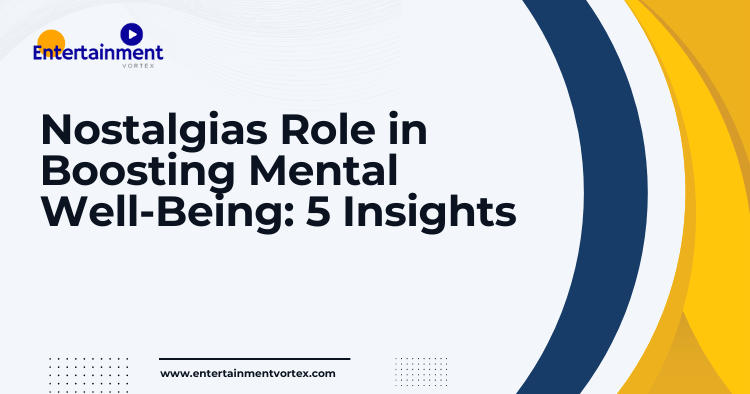Table of Contents
- Understanding Nostalgia
- Nostalgia as a Source of Comfort
- Building Connections through Nostalgia
- Nostalgia and Resilience
- Practical Ways to Harness Nostalgia
Understanding Nostalgia
Nostalgia is a complex emotional experience that blends feelings of happiness and sadness. Defined as a sentimental longing for the past, it often evokes memories of cherished moments, people, and places. While nostalgia was once thought to be merely a wistful yearning for times gone by, researchers now recognize its potential benefits for mental well-being.
Recent studies suggest that nostalgia can help individuals cope with stress, combat loneliness, and foster a sense of belonging. A study published in the journal Psychological Science indicates that nostalgia enhances mood and increases feelings of social connectedness. When we reminisce about cherished memories, we often find a sense of comfort and warmth that can be soothing during challenging times.
Did You Know? Nostalgia is not just a personal experience; it can also be shared among groups, creating a collective sense of belonging.
FAQs:
- What triggers nostalgia? Nostalgia can be triggered by various stimuli, including music, photographs, scents, or even particular places.
- Is nostalgia always positive? While nostalgia is generally linked to positive feelings, it can also bring about sadness or longing for what is lost.
Nostalgia as a Source of Comfort
Nostalgia can act as a powerful source of comfort during difficult times. When we reflect on positive memories, our brains release feel-good chemicals like dopamine, which can elevate our mood and reduce stress. This emotional boost is particularly beneficial during periods of anxiety or uncertainty, allowing us to escape, if only momentarily, into a more comforting mental space.
A study in the journal Emotion found that nostalgia serves as a coping mechanism, providing individuals with a sense of continuity and stability in their lives. By recalling fond memories, we can remind ourselves of happier times, helping to reduce feelings of sadness or despair.
Quick Tip: To enhance your comfort during stressful times, try to keep a few nostalgic items nearby—like a picture from a happy event or a song that lifts your spirits.
Visual Element
| Nostalgia’s Effects on Mental Well-Being |
|---|
| Emotional Comfort |
| Reduces feelings of loneliness |
| Enhances mood |
| Promotes a sense of belonging |
| Provides a psychological buffer |
FAQs:
- How can I use nostalgia for comfort? Engage with nostalgic items, such as old photographs, favorite songs, or movies that evoke happy memories.
- Is nostalgia a sign of being stuck in the past? Not necessarily. While nostalgia involves looking back, it can also provide valuable lessons and insights for the present.
Building Connections through Nostalgia
One of the most profound aspects of nostalgia is its ability to foster social connections. Sharing nostalgic memories with friends or family can strengthen bonds and create a sense of intimacy. When we reminisce together, we not only relive our happy moments but also build shared narratives that enhance our relationships.
Research from the University of Southampton shows that nostalgia can promote prosocial behavior, making individuals feel more connected to others and increasing their willingness to help. When we feel nostalgic, we often recall experiences that highlight our shared humanity, reminding us that we are not alone in our journeys.
Social Insight: Engaging in nostalgic conversations can act as a bridge, helping to mend relationships and deepen existing ones.
FAQs:
- How can I share nostalgia with others? Organize a nostalgia-themed gathering where everyone brings something that reminds them of a cherished memory. This can spark conversations and shared laughter.
- Can nostalgia improve relationships? Yes, sharing nostalgic memories can foster deeper connections and improve relationship satisfaction. For more ideas on creative ways to bond, check out 10 Fun Hobbies to Enjoy Together with Your Kids.
Nostalgia and Resilience
Nostalgia can also play a crucial role in building resilience. By reflecting on past experiences, we can draw strength and inspiration from the challenges we’ve overcome. Nostalgia allows us to see our personal growth and reminds us that we have faced difficulties before and emerged stronger.
A study in The Journal of Personality and Social Psychology found that nostalgic individuals are more likely to have a positive outlook on life and greater emotional resilience. By cultivating a nostalgic mindset, we can learn to embrace our life’s journey, including its ups and downs, and develop a more robust sense of self.
Resilience Reminder: Reflecting on past challenges can be empowering, showing us that we have the capacity to overcome adversity.
FAQs:
- Can nostalgia help with current challenges? Yes, by reminding us of past victories and cherished moments, nostalgia can provide motivation and hope during tough times.
- How can I build resilience through nostalgia? Reflect on your past experiences and identify moments of strength. Journaling these memories can help reinforce your resilience. For more on using creativity to enhance emotional well-being, consider exploring 10 Easy DIY Projects for Beginners to Spark Creativity.
Practical Ways to Harness Nostalgia
Harnessing the power of nostalgia can be a simple yet effective way to boost your mental well-being. Here are some practical strategies to incorporate nostalgia into your daily life:
- Create a Nostalgia Playlist: Compile a list of songs that remind you of specific moments in your life. Listen to it when you need a mood boost.
- Scrapbooking: Gather old photos, ticket stubs, and other memorabilia to create a nostalgic scrapbook. This can be a fun activity and a tangible reminder of cherished memories. For more creative ideas, check out 10 Essential Tips to Kickstart Your Scrapbooking Journey.
- Nostalgia Journaling: Set aside some time each week to write about your favorite memories. Reflect on what made those moments special and how they shaped you.
- Nostalgic Movie Night: Host a movie night featuring classic films or shows from your childhood. Enjoying these with friends or family can enhance the experience. For tips on creating memorable gatherings, see 10 Tips for Hosting Fun Virtual Events with Family & Friends.
- Engage with Old Friends: Reach out to old friends and reminisce about shared experiences. This can reignite connections and create new memories.
Nostalgia in Action: Consider creating a ‘memory jar’ where you write down happy memories and read them whenever you need a lift.
FAQs:
- How often should I engage with nostalgia? It’s beneficial to incorporate nostalgic moments into your life regularly, but moderation is key to avoid dwelling on the past.
- Can nostalgia be harmful? While nostalgia is generally positive, excessive longing for the past can hinder personal growth. Balance is essential.
By embracing nostalgia and recognizing its potential benefits, we can enhance our mental well-being and foster deeper connections with ourselves and others. Whether it’s through music, memories, or meaningful conversations, nostalgia can be a powerful tool for comfort, resilience, and happiness.
Further Reading: For more insights on nostalgia and its psychological effects, you might find these resources helpful: Psychology Today and American Psychological Association. Also, look for 10 Essential Tips for Craft Fairs Prep Expectations Guide for more creative outlets that can aid in emotional well-being.






